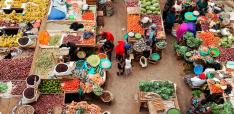Deglobalisation – What’s in a World Word?

Sam Pryke reviews the literature on the supposed demise of globalisation to argue that it was and should be viewed as a process, rather than an endpoint we have been heading towards.
As terms go, ‘deglobalisation’ isn’t a particularly appealing one, not least because the process it indicates, the reverse of globalisation, has always had contested meanings. However, it seems to be more or less established, certainly widely used, to denote something that is currently taking place. An indication of its topicality is that academic articles are appearing that only mention deglobalisation in the introduction and conclusion but include it as a key word. One suspects that the authors correctly predicted that spotlighting it would increase their chances of publication. Journals themselves have been gathering together papers for special issues (for instance, International Affairs, 97(5), September 2021). It would be surprising if the editors of Global Policy hadn’t at least considered the idea. There are alternative expressions available. The Economist (2019) magazine, a publication that has good form on the matter as it has been warning of the imminent death of free trade since 1843, favours ‘slowbalisation’. The term ‘reglobalisation’ used elsewhere (for instance in the special issue of Globalizations 18(1), 2021) has a slightly different meaning as it is used to refer to normative evaluations of what it takes to save globalisation from itself, but is closely related in as much as it indicates that the forward march of the phenomenon is stalling or actively reversing. Given all the talk, over 3000 uses in the last two weeks according to Google as of July 19th, 2022, it is worth pausing to consider the validity of deglobalisation.
The first point to make is that the term deglobalisation is not new. The first reference I can find to it is the very title of a 2002 book by the Pilipino writer and activist, Walden Bello (2002). Its initial use was within a left-wing critique of globalisation, not a given empirical reality. Joseph Stiglitz’s (2002) better known book, Globalization and its Discontents, recently updated, came out the same year. Bello articulated the developing world perspective of what had become known as the ‘anti-globalisation movement’ that had emerged in protests at meetings of the World Trade Organisation, notably in Seattle in November 1999. Bello (2002: 113) claimed that ‘deglobalization is not about withdrawing from the international economy’, but it does involve ‘reorienting economies from the emphasis on production for export to production for the local market’. This emphasis on local markets and the ‘pluralistic decentralization of institutional power’ is one that can be found in, broadly, analyses over the last 20 years of globalisation as neoliberal capitalism. In Britain, the writings of George Monbiot (2022) are a compelling instance of this discourse. His latest book, Regenesis, is a devasting examination of the practices of the global food industry, in his view the single biggest cause of environmental destruction. He doesn’t advocate happy hobbit home agricultural self-sufficiency. Monbiot reviews cutting edge developments in food technology. But the book is a searing indictment of the devastation wrought by capitalist intensive farming.
This case for deglobalisation was never confined to the political left. An early mainstream warning that it was perhaps in danger of going too far was made in 1998 by Dani Rodrik (1998). Peter Navarro (2006) produced several academically less respectable critiques of globalisation, more diatribes about China, before coming an advisor to Donald Trump. But the term wasn’t used to describe the reality of what’s taking place in the world until after the financial crash of 2008. That event and its aftermath gave rise to all kinds of dire warnings about the death of globalization that didn’t play out. There was no systematic attempt by governments to pull apart the integration of economies (Pryke, 2012). Instead, globalisation on most, if not all, measures regained the levels attained in 2007 by 2011/12 - and then grew further.
However, it became clear that, although it was business as usual for capitalism as governments pumped trillions into economies, 2008 had set in train longer term political shock waves that undermined globalisation. This gave rise to books a few years later that sort to capture aspects of what was afoot. Typically, titles exceeded the case made. For instance, Stephen D. King’s 2016 book (2016) was a fairly careful summation of the state of globalisation, including some interesting discussion of the impact of artificial intelligence on migration and supply chains, but had the over-the-top billing of Grave New World: The End of Globalization - and for good measure -, the Return of History. King didn’t use the term deglobalisation. Other authors did as they assessed the world as it endured the Trump presidency. Jeremy Green (2019) uses it to calibrate global flows in his book, Is Globalization Over?
The dual impacts of the Covid19 pandemic and the Russian invasion of Ukraine have, as indicated, given rise to the normalisation of the term. In fact, when globalisation is currently discussed, it’s generally in relation to deglobalisation, i.e. the process in reverse. It would take at least one of those journal special issues to make any kind of assessment of the reality of deglobalisation at this conjuncture. But that caveat out of the way, I think the following points are relevant.
The first thing to say is that, once again, key empirical indicators of globalisation don’t neatly match the sense of gloom produced by economic stagnation, rising energy costs, other commodity price hikes, intensifying supply chain problems and protective import tariffs. Combined and exacerbated by inflation, in part a product of ‘global’ financial speculation, there are undoubted cost-of-living predicaments in wealthy economies and potentially catastrophic disruptions in grain supplies to low-income countries. But crises for peoples are not necessarily crises for global capitalism. World trade, the greater part of which is through intra firm and product connection, grew in the first quarter of 2022 to $7.7 trillion, an increase of about $1 trillion relative to Q1 2021 and $250 million more than the final period to Q4 2021 (UNCTAD, 2022). Now this record value was mainly due to rising commodity prices, but even trade volumes marginally increased. Interestingly, the single biggest hit to world trade has been the Shanghai Covid lock down, not war in Ukraine.
Global foreign direct investment had recovered to pre-pandemic levels by the end of 2021 (UNCTAD, 2022). Given the uncertainty, risk being key to investment decision making, it is unlikely to increase this year. However, a search for FDI reveals that for economies as diverse as the USA, Nigeria, Saudi Arabia and Romania levels have grown in 2022. In the region of the world where states and peoples are largely indifferent to the Russian invasion of Ukraine, Asia, the evidence suggests (Lin and Reed, 2022) that the pre-existing trend towards greater regional economic interconnection, always a concomitant of globalisation, has accentuated, driven by growth in Taiwan, Indonesia, Malaysia, Thailand, Singapore and the Philippines, rather than China. Not all Asian states are seeing stable growth. The background to Sri Lanka’s current political crisis is a combination of global shocks, most importantly sharp rises in the price of oil and food imports (Sandbu, Wheatly and Reed, 2022). The wider point is that those who argued (see Harris, 2003) that such has been the integration of world markets that there is no ‘going back’ to national economies were right. Governments may talk of greater energy self-sufficiency but the possibility of a wholesale move to national economic autarchy is a nonstarter.
Other indices question any glib assertion that deglobalisation has now gathered an unstoppable momentum. Tourist trips are down in Europe, Asia and elsewhere because of the enforced absence of Chinese holiday makers. But, that important subtraction aside, the numbers are buoyant. Currently, Europeans are jetting off from one wild fire zone, urban and rural, to another in equivalent numbers to 2019, as those with sufficient disposable income (or credit) busily try to make up for all those trips lost to Covid19. The pandemic brought very real restrictions in migration as states moved to tighten borders and remove informal migrants. And, yes, this form of human mobility has fallen over the last two years. However, even here the impact was not as profound as forecast. Despite predictions of a large decline in international remittances, 2020 saw a drop of only 2.4% from the 2019 global high. Growth then returned in 2021 according to the UN World Migration Report.
The measure of globalisation that some writers (James and Steger, 2021: 807) suggest ultimately outweighs the deglobalisation of nationalism, communication capability through internet access, has increased by an astonishing 1392 per cent since 2020 according to the estimations of Internet World Stats. If current trends continue, and they do seem immune to contemporaneous events, the majority of people in all geographic regions of the world will be using the internet by the end of the year – although how extensive and critical that web access is, is obviously another question.
A second observation is that globalisation affords the possibility for redirecting the flows that are integral to it. The case of Russia and Russians is indicative, even if one leaves out the irony that the increased price of continuing Russian energy exports has more than offset the financial brunt of Western sanctions. There is evidence (Lawson, 2022) that some of the increased Russian exports of oil to India, part of a wider and successful attempt to up trade with other BRICS, is finding its way to European markets. According to the Ukrainian government (Bryan and Walker, 2022), banks like HSBC and JPMorgan Chase have provided credit to the traders that ship Russian oil. It has no doubt irked Russian oligarchs that they’ve had to sell some of their properties and football clubs in Europe at knock down prices, whilst their super yachts have been impounded. But such is their wealth, they’ve been able to buy up luxury villas and boats in the UAE (Kerr, 2022). Agencies there specialise in helping such clients transfer real estate riches from London to Dubai. Colleges catering for their children, formally educated at British public schools, expand. Oligarch nationalism has always been at least as much global criminal as genuine, i.e. purely selfish. Middle class Russians who visited Cuba and Greece until February can still holiday in Turkey and Thailand. IT experts, some hostile to Putin, others indifferent, quickly left Moscow and Saint Petersburg for Georgia to join an established Russian business (and now dissident) community in Tiblisi (Champion and Bedwell, 2022). More recently, significant numbers have migrated to South America to restart their web platform companies (Elliot, 2022).
A final observation is that whilst obviously we don’t know the outcome of war in Ukraine, it marks only a bloody intensification of a trend that was already well established. This is true both of the relationship between the Putin administration and European states and the US, and the latter and China. The 2018 Defence Strategy of the United States of America that identifies China and Russia as the US’s long term strategic opponents, rather than terrorists, was itself a formal statement of a policy approach that had been several years in coming – a policy reality in respect to the sanctions on Russia imposed after the annexation of Crimea in 2014. The tone struck – ‘global disorder’, ‘decline in the long-standing rules-based international order’, ‘complex and volatile inter-state strategic competition’ – is a world away from that of the warm words and group photos of smiling world leaders at the summits of international organisations either side of the millennium. At an International Monetary Fund meeting in April, Russian and European officials did all they could to avoid one another (Smith, 2022).
There are a number of ways of situating this. One is that the emergence of rival imperial formations is only the return (at least attempted return in the case of Russia), after a relatively brief global moment, of the single most important entity in human history: empires – not that ‘great powers’ were ever genuinely subsumed by a benign and harmonious globalism, quite the contrary (Davis, 2022). Another is that the decade after the collapse of state Stalinism in Eastern Europe and the Soviet Union, rightly identified by Putin as a body blow to Russian imperialism, ushered in a unique but brief historical period. In Free, Lea Ypi (2021) colourfully sketches just what a psychological reset took place in one of the then least globalised countries in the world – although she notes a similar worldliness and ideological faith of a communist schoolteacher and visiting World Bank official. At least some of the lustre of ‘freedom’, ‘democracy’, ‘markets’, ‘civil society’, ‘structural reform’ ‘becoming Europeans’ (she doesn’t mention ‘globalisation’ as such) wore off with the collapse of the mass pyramid scams in 1997, the year that also saw the Asian Financial Crisis.
Finally, to return to terms, what of our old friend globalisation? There was a tendency in the 1990s to define globalisation as akin to a brave new world we have collectively entered. Such rarefied descriptions are best viewed as relics of that era. The approach that has fared best in my view was that provided by David Held et al in Global Transformations, a landmark book as it provided a systematic understanding of globalization. The authors wrote (1999: 27-28) that, ‘Globalisation should be understood as a historical process, not a point we either have or have not reached. It should be conceived as a spatial process along a continuum from the local, the national, the interregional to the global that interconnects human communities through economics, politics, culture and sport, through crime and the environment. Globalisation means the quickening and intensifying over time and space of the flows of commodities, of currencies, of words, images and people. It refers to the types of interaction and structures that arise out of all of this’ (1999: 27-28). Clearly the writers didn’t anticipate globalisation slowing down, let alone reversing. However, the crucial accent on process, not an ‘end point we either have or have not reached’, at least allows for the partial deglobalisation of our times.
Sam Pryke, University of Wolverhampton.
Photo by Tyler Lastovich
References
Bello, W. (2004) Deglobalization: Ideas for a New World Economy. New York: Zed Books, 2002.
Brayan, K. and Walker, O. (2022) Kyiv Accuses banks of war crimes for providing credit to Russian oil traders. The Financial Times, July 15th. Last visited 21.7.22 at https://www.ft.com/content/ba60a1da-ff70-4099-ba47-81c1e5de2050
Campion, M. and Bedwell, H. (2022) Russia’s Brain Drain Is Officially Underway, Bloomberg UK, July 6th. Last visited 22.7.22 at https://www.bloomberg.com/news/features/2022-07-06/russian-refugee-tech-workers-make-georgia-a-stepping-stone-for-global-career
Davies, W. (2022) Destination Unknown. The London Review of Books, 44(11), June 9th. Last visited 20.7.22 at https://www.lrb.co.uk/the-paper/v44/n11/william-davies/destination-unknown
Economist, The (2019) Slowbalisation: The Future of Global Commerce, January 24th.
Elliot, L. (2022) Russia’s digital nomads head for Latin America. The Financial Times, June 22nd.
Green, J. (2019) Is Globalization Over?. Cambridge: Polity.
Harris, N. (2003) The Return of Cosmopolitan Capital: Globalization, the State and War. London: I.B. Tauris.
Held, D.; McGrew, A.; Goldblatt, D. and Perraton, J. (1999) Global Transformations: Politics, Economics and Culture. Cambridge: Polity Press.
James, P., and Steger, M.B. 2021. Globalization in Question: Why Does Engaged Theory Matter?. Globalizations 18(5), 794–809.
Lawson, A. (2022), India may be back into Europe for Russian oil. The Guardian, June 27th. Last visited at https://www.theguardian.com/business/2022/jun/26/concerns-india-back-door-into-europe-for-russian-oil
Kerr, S. (2022) Wealthy Russians flock to Dubai as west tightens sanctions. The Financial Times, March 10th. https://www.ft.com/content/d6d3b45a-35cc-4e32-b864-b9c0b1649a79
King, S.D. (2017) Grave New World: The End of Globalization, the Return of History. New Haven: Yale University Press.
Lin, A. and Reed, J. (2022) South-east Asia bucks global stagflation trend as tourism and exports climb. The Financial Times, June 21st. Last visited 20.7.22 at https://www.ft.com/content/d1d5f596-d8af-4fcf-a01a-25b9fec8e245
Monbiot, G. (2022) Regenesis: Feeding the World without Devouring the Planet. London: Penguin.
Navarro, P. (2006) The Coming China Wars: Where They Will Be Fought and How They Can Be Won. London: Pearson.
Pryke, S. (2012) Economic Nationalism: Theory, History and Prospects: Economic Nationalism. Global Policy 3(3), 281–91.
Rodrik, D. (1998) Has Globalization Gone Too Far. Challenge 41(2), 81-94.
Sandbu, M., Wheatly, J. and Reed, J. (2022) The Global Fallout. The Financial Times, July 16th.
Smith, C. (2022) IMF walkout and downgrades underscore bleak economic outlook. The Financial Times, April 22nd.
Stiglitz, J.E. (2002) Globalization and Its Discontents. London: Allen Lane.
UNCTAD (2022) World Investment Report. Last visited 20.7.22 at https://unctad.org/system/files/official-document/wir2022_en.pdf
UNCTAD (2022) Global trade hits record $7.7 trillion in first quarter of 2022, July 7th. Last visited 20.7.22 at https://unctad.org/news/global-trade-hits-record-77-trillion-first-quarter-2022
Ypi, L. (2021) Free, Coming of Age at the End of History. London: Penguin.

